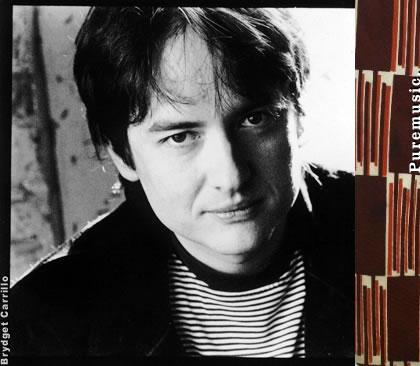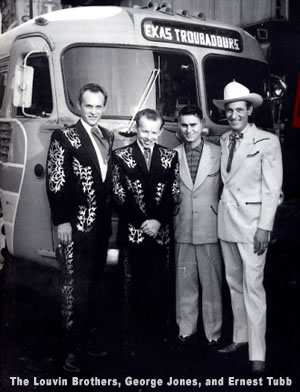
A Conversation with
Paul Burch
Puremusic: I didn't dive into East to West until 5:30 this morning. And now I've heard it like six times. It's amazing.
Paul Burch: Oh, thank you.
PM: I mean, you've done it again.
[laughter]
PM: I've talked to a couple of people about it this morning, and everybody agreed, that you're one of Nashville's best, and just really unique. To me, the record is kind of confounding, not only in how good it is, but the fact that when so many people try to do what it is you might be said to be doing, that is--
[laughter]
PB: That was very well said, Frank.
PM: All you're doing, of course, is being yourself.
PB: Right.
PM: But one might say that, well, he's playing very old music, but in a modern way, and certainly without affectation, just from a sincere love of this music, and here's what comes out of him. But so many people try to do that well. And I just don't know anybody that does it as well as you.
PB: That's very kind. I think probably ignorance plays a big part in my perceived success at doing what you say it appears that I'm doing--
PM: [laughs]
PB: --because I don't think about it. And I'm sure a lot of people would say I'm myself because I don't think about it. But I don't wring my hands over it. The only thing I can attribute "it" to, if that's the perception--and it's close; it's not wrong, necessarily--is that I, not being a very old guy, but I'm forty, and so I grew up at a time when there was just a lot of different kinds of music. And my first memories of music, like most people, are when I was two and three and four years old. And in 1970, when I was four years old, Tom Jones had his own show, and Johnny Cash had his own television show. They were variety shows.
PM: And Glen Campbell.
PB: Glen Campbell. So even though my memory of some of those are kind of scattershot, I do remember them existing--and Hee-Haw existing. And everything was going strong at that point. Frank Sinatra hadn't even cut "New York, New York" yet.
PM: Really?
PB: No, I don't think so. I don't think he cut "New York, New York" until the '70s. [Quite so. It's the theme song from the Martin Scorsese film of the same name from 1977 with Liza Minelli. Sinatra did not record it for another two years, in 1979.]
PM: Wow.
PB: Either that, or "My Way."
PM: One of those, yeah.
PB: But he retired at one point, and then made the Ol' Blue Eyes is Back record. So I mean, he was still cranking out records. Count Basie was still on television. Ella Fitzgerald would still be on television. Louis Armstrong would be on television. All the generations were taking advantage of radio and records and the media in a way that can never be repeated. I think it may seem like Americana--I don't know, I don't want to speak about Americana, because I have no--I don't know what to say about that.
PM: [laughs]
PB: But for me, Americana is not a big deal. It seems like it's a general--not that that's your question--but I mean, some people feel like they should either really support or it or really not support it. A lot of what is called Americana is junk, but it's junk because it's just not good. It doesn't have anything to do with what is called "Americana." It could be called folk, it could be called jazz. There's plenty of music that's not so good. The only thing about Americana that's been a bummer is that I think there is a sort of visceral perception that country music is not produced, that good country music is not arranged, and was recorded with one microphone, and all that kind of stuff--which is entirely not true.
PM: Right.
PB: There's not even a single jazz record that was--I mean, there are one-offs, there are odd things, like Ray Charles at Newport, that was recorded with one mic. But that didn't happen very often. Even the Carter Family was probably recorded with a couple of mics. The technology of music has always been to get it to sound as good as possible, and stuff has always been produced. Country records are produced. Hank Williams records were produced to the eyeteeth.
PM: Right.
PB: I love Hank Williams, and I've heard everything, I think, there is to hear, even things I'm not supposed to hear. And I can't tell one song from the other until he starts singing, because the studio stuff, the steel starts the slow stuff, the fiddle starts the fast stuff. And it's practically the same thing. I mean, that's just the way they did it. Once they found the rhythm, that's the way they did it.
So for me, there's no less guile in what I do than anybody else. But I'm not hung about it. I love Howlin' Wolf as much as I love Charley Patton, as much as I love Hank Williams. And I could easily do a whole interview talking about one person that I really like. But that doesn't make me special just because I've listened to it for a long time. All those combinations make me who I am.

But one thing I'm not hip for about Americana is people giving other musicians a hard time for just getting to Buck Owens or just getting to the Louvin Brothers, because it doesn't matter when you get there; if it turns you on, it turns you on.
PM: Right. And it turns you on when it turns you on.
PB: Right. It doesn't matter if you marry the love of your life when you're thirty or fifty or sixty or twenty-six, it doesn't matter, you found her. Right?
PM: [laughs]
PB: If it works for you, then great... It's a small musician who wouldn't say, "Good, now you're there, now there's a whole other bunch of rooms that you can go into."
PM: Absolutely.
PB: Not to sound like Joseph Campbell, but I mean, it's--
PM: [laughs]
PB: --just not that big a deal. You play music, and you hope that you find something where you find your voice, and it's fun. So there you go. continue
print (pdf) listen to clips puremusic home